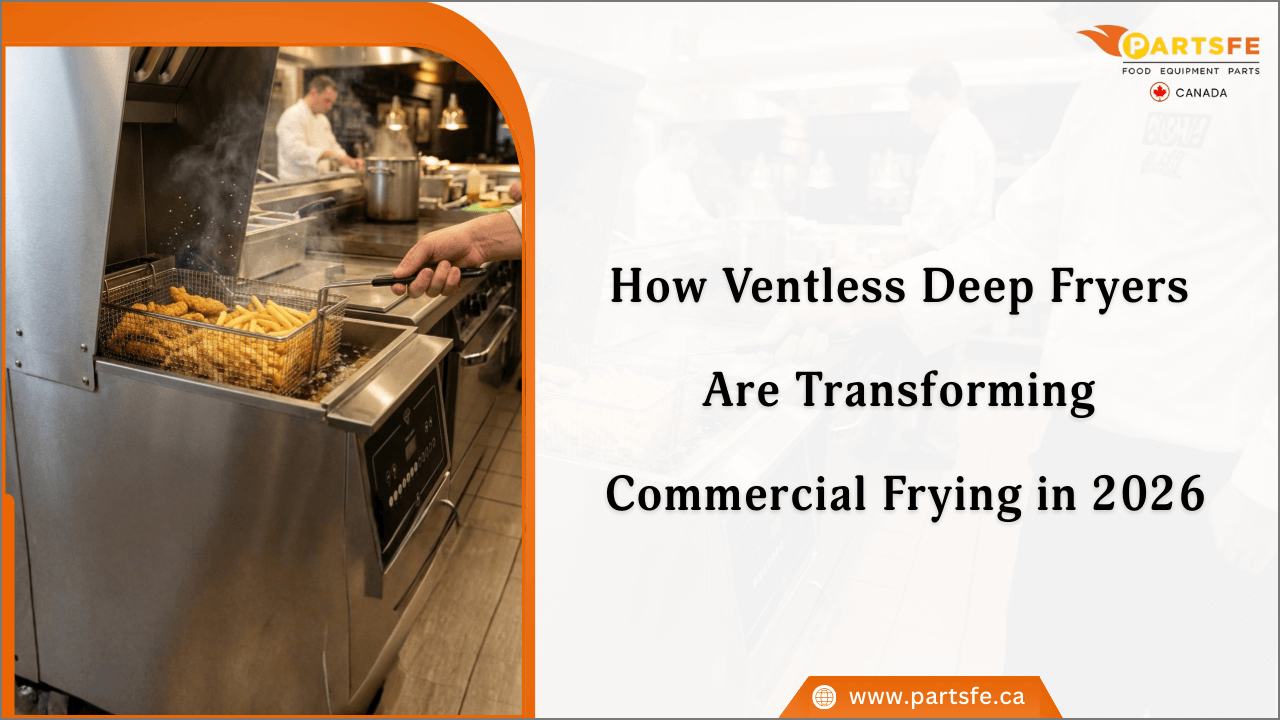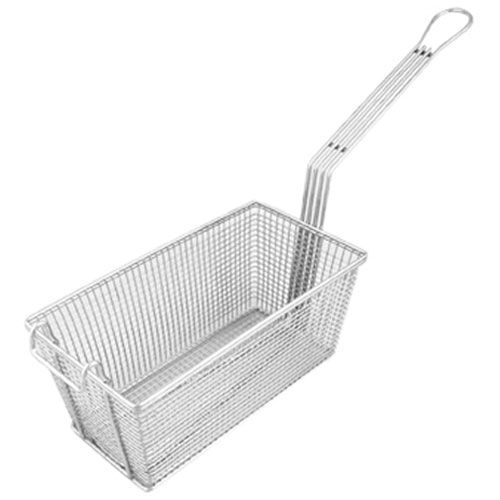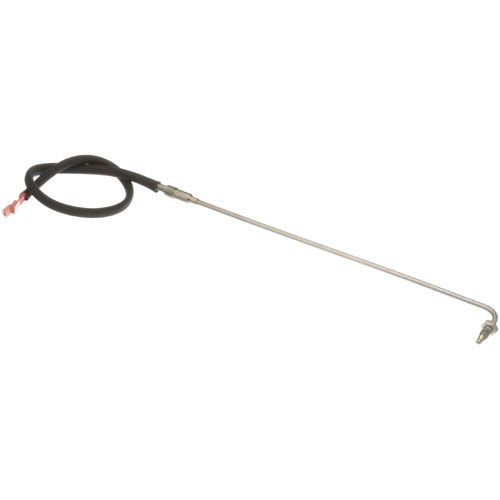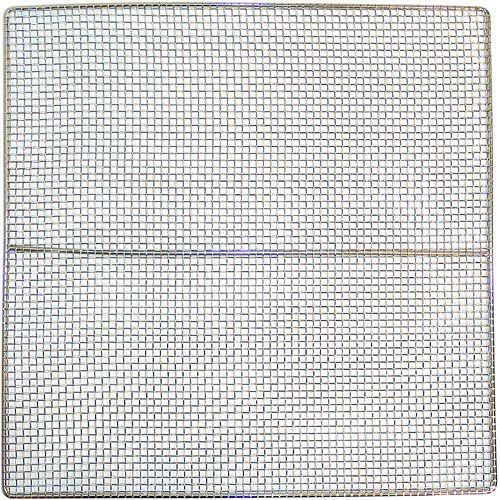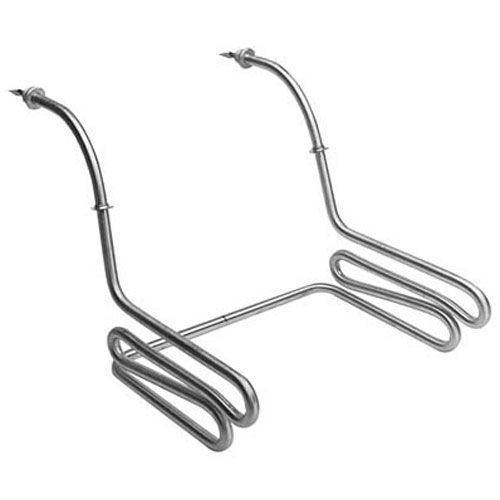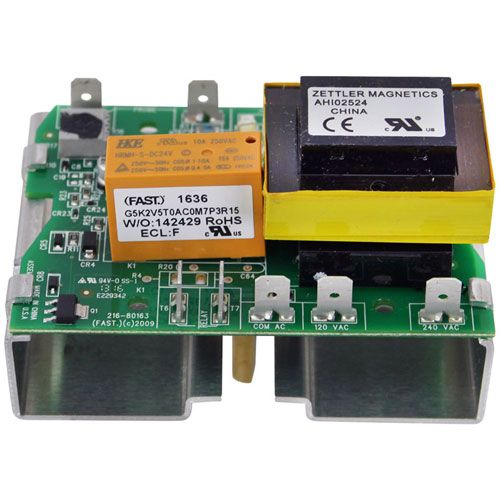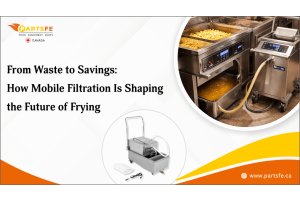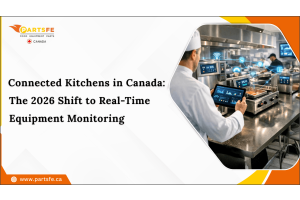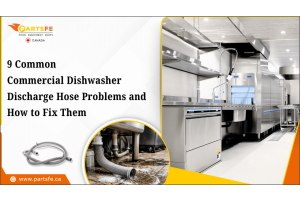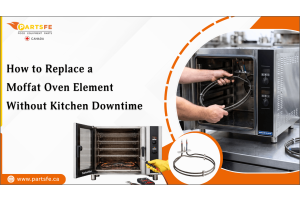How Ventless Deep Fryers Are Transforming Commercial Frying in 2026
Commercial kitchens are rethinking traditional frying as rising real estate costs, stricter regulations, and sustainability goals reshape foodservice operations. In 2026, ventless deep fryers—also known as hoodless deep fryers—have moved from niche use to mainstream adoption across restaurants, ghost kitchens, healthcare facilities, and high-traffic venues.
As commercial kitchen equipment becomes more automated and energy efficient, ventless frying technology stands out for its flexibility, cost advantages, and ability to modernize commercial frying systems without conventional ventilation infrastructure.
What Makes Ventless Deep Fryers Different from Traditional Frying Systems
Traditional commercial frying relies on large ventilation hoods, ductwork, and rooftop exhaust systems to control heat, smoke, grease, and odors. While effective, these systems are costly, space-intensive, and heavily regulated, limiting flexibility in modern kitchen design. Ventless deep fryers represent a structural shift by integrating air management directly into the appliance.
-
Dependence on External Ventilation Infrastructure: Conventional frying setups require permanent ventilation that dictates kitchen layout and increases construction complexity, particularly in retrofits, leased spaces, and non-traditional foodservice locations.
-
Integrated Filtration and Self-Contained Air Management: Ventless fryers use multi-stage filtration to capture grease, smoke, and odors at the source, clean the air, and safely recirculate it within the kitchen—eliminating the need for traditional hood systems.
-
Simplified Installation and Space Efficiency: By removing external ducting and rooftop exhaust, ventless fryers reduce installation constraints and support compact footprints, making them suitable for kiosks, ghost kitchens, food halls, and urban spaces.
-
Modular and Scalable Kitchen Design: Without fixed ventilation infrastructure, kitchens can be more modular and adaptable, allowing operators to scale, replicate, or reconfigure frying operations with minimal redesign.
By replacing infrastructure-heavy systems with integrated technology, ventless deep fryers are enabling more flexible, cost-effective, and future-ready commercial kitchens.
Key Technological Innovations Driving Ventless Fryers in 2026
The widespread adoption of ventless deep fryers has been driven by significant technological advancements over the past few years. In 2026, these units represent a convergence of filtration science, digital controls, and energy optimization.
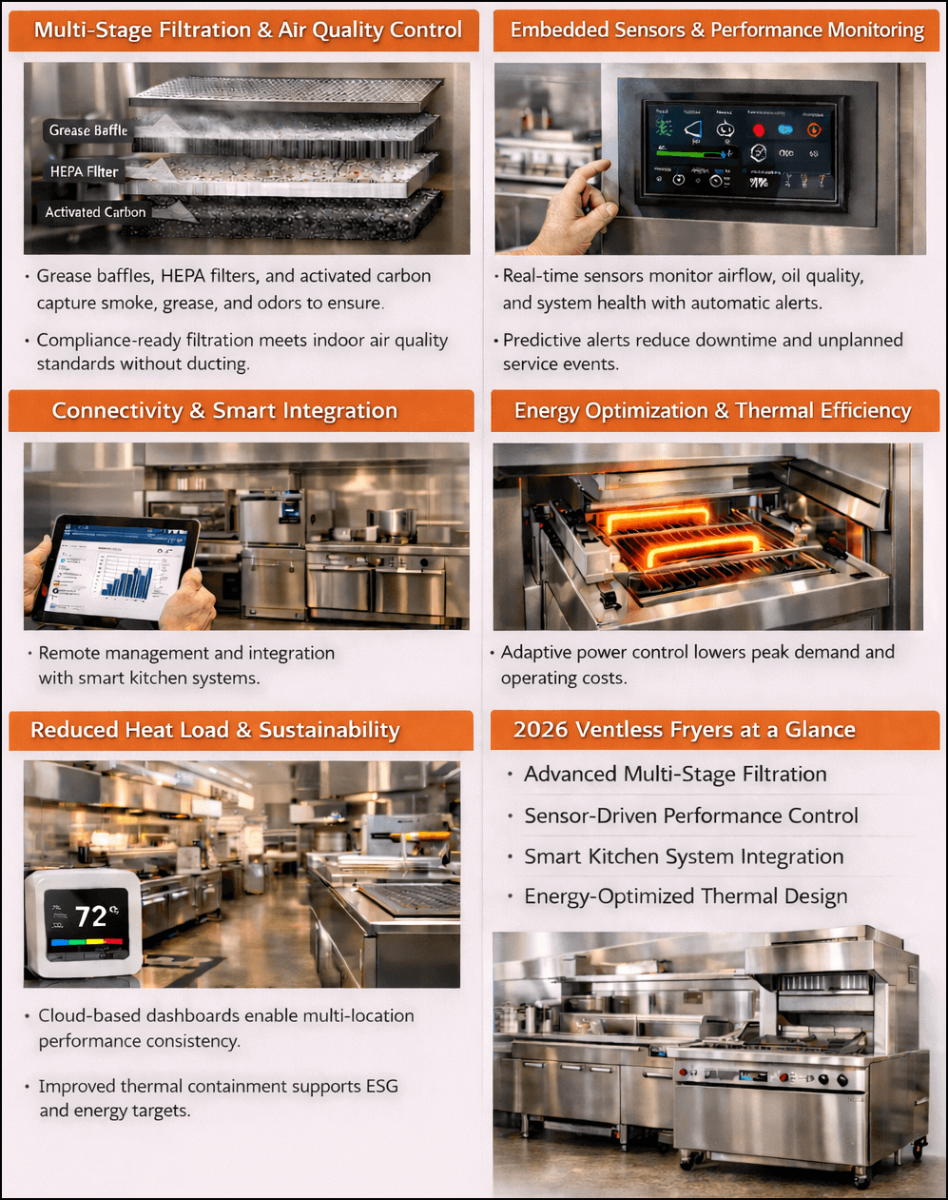
|
Disclaimer: This infographic is provided for general informational purposes only. Ventless deep fryer performance, installation requirements, and regulatory approvals may vary by manufacturer, model, menu application, and local building or fire codes. Always consult equipment manufacturers, certified installers, and local authorities having jurisdiction before making purchasing or installation decisions. |
Check out the future of frying: mobile filter systems for commercial kitchens, which explores how mobile oil filtration technology improves food quality, extends oil life, reduces costs, and enhances operational efficiency in professional kitchens.
Operational Benefits for Commercial Kitchens and Foodservice Brands
The operational advantages of ventless deep fryers extend well beyond simplified installation. In active commercial kitchens, these systems improve flexibility, space utilization, and production consistency—key requirements for modern foodservice brands operating in fast-changing environments.
-
Faster Deployment and Installation Flexibility: Ventless deep fryers eliminate the need for ductwork and hood systems, significantly reducing installation time. This allows operators to bring kitchens online quickly, particularly in pop-up restaurants, ghost kitchens, seasonal operations, and retrofit projects where ventilation upgrades are impractical.
-
Greater Location and Layout Freedom: By removing dependence on fixed ventilation infrastructure, ventless fryers enable frying operations in compact or non-traditional spaces. Kitchens can be designed around workflow efficiency and throughput rather than ventilation constraints, resulting in better ergonomics and labor productivity.
-
Consistent Output in High-Demand Environments: Designed for commercial-scale use, modern ventless fryers deliver stable temperature control and automated oil management. This ensures consistent frying performance across long service periods, making them suitable for busy quick-service and fast-casual operations.
By improving deployment speed, spatial efficiency, and operational reliability, ventless deep fryers allow foodservice operators to adapt quickly while maintaining consistent quality and output.
Cost, Compliance, and Sustainability Advantages of Ventless Frying
Beyond operational efficiency, ventless deep fryers offer compelling financial and regulatory benefits that are driving adoption across the foodservice industry.
|
Operational Area |
Traditional Hooded Frying Systems |
Ventless Frying Systems |
|
Upfront Capital Cost |
High capital investment driven by ventilation hoods, ductwork, rooftop exhaust, fire suppression integration, and structural modifications |
Lower total project cost due to a self-contained design that eliminates or minimizes ventilation infrastructure |
|
Installation Complexity |
Lengthy and disruptive installation requiring coordinated trades, building modifications, and extended downtime |
Faster, simpler installation with minimal construction and quicker kitchen readiness |
|
Code Compliance |
Complex, site-specific approvals involving fire, mechanical, and building codes |
Appliance-level compliance simplifies inspections and reduces regulatory uncertainty |
|
Energy Efficiency |
Significant energy loss from exhausting heated or cooled indoor air |
Reduced energy consumption through recirculated air and efficient heat management |
|
Heat Load on Kitchen |
Higher ambient temperatures increase HVAC demand and staff discomfort |
Lower radiant heat improves working conditions and reduces HVAC strain |
|
Indoor Air Quality |
Performance depends on external exhaust efficiency and maintenance |
Multi-stage filtration delivers consistent air quality and odor control |
|
Operational Flexibility |
Fixed infrastructure limits equipment placement and kitchen redesign |
Greater layout flexibility and adaptability across different locations |
|
Sustainability Alignment |
Limited ability to support ESG and emissions-reduction goals |
Strong alignment with sustainability initiatives and energy-reduction targets |
|
Expansion & Scalability |
High cost and long timelines make rapid expansion difficult |
Standardized, repeatable deployments support faster multi-unit growth |
|
Caution: Actual costs, regulatory approvals, and operational performance may vary based on local codes, facility conditions, menu grease load, and equipment specifications. Ventless frying systems must be properly sized, installed, and maintained to ensure safe operation and compliance. Always verify requirements with local fire, health, and building authorities prior to installation. |
Explore From Oil To Air: The Innovative Shift To Hot Air Fryers In Commercial Restaurants, which highlights how hot air fryers are changing commercial kitchens with less oil and greater efficiency.
Summary: The Future Outlook of Commercial Frying with Ventless Technology
By 2026, ventless deep fryers have become central to modern foodservice design, enabling professional frying without traditional ventilation infrastructure. This shift is reshaping kitchen layouts, expanding where frying can occur, and helping brands scale amid rising costs and regulations.
As automation and sustainability reshape commercial frying, ventless technology supports more flexible, efficient, and future-ready kitchen operations.
Key Takeaways:
-
Ventless deep fryers eliminate reliance on traditional hood and duct systems, enabling greater flexibility in kitchen design and location selection.
-
Integrated filtration and smart controls support consistent performance, compliance, and cleaner indoor environments.
-
Lower construction and installation costs reduce barriers to entry for new concepts and expansions.
-
Energy-efficient operation and reduced heat loss align ventless frying with sustainability and ESG objectives.
-
Foodservice brands that adopt ventless frying technology gain scalability, faster deployment, and long-term operational resilience.
As the foodservice industry continues to modernize, ventless deep fryers will play a defining role in how commercial frying systems adapt, compete, and grow in an increasingly efficiency-driven and regulation-conscious market.
Looking for reliable commercial kitchen & restaurant equipment parts in Canada? Shop now at PartsFe CA for quality components you can trust. From motors and control boards to refrigeration and ice machine parts, we supply dependable products from trusted brands. With competitive pricing, fast Canada-wide shipping and expert support, we help keep your foodservice operations running smoothly.
FAQs
Are ventless deep fryers suitable for high-volume commercial kitchens?
Yes. Many 2026-era ventless fryers are specifically engineered for continuous, high-output operation. When properly specified and maintained, they can support high-volume frying solutions in quick-service restaurants, cafeterias, and food courts.
Do ventless deep fryers meet health and fire safety regulations?
Ventless fryers are designed to comply with applicable health, fire, and electrical safety standards. However, local code approval is always required. Operators should verify certifications and consult local authorities during planning.
How much does it cost to install and operate a ventless deep fryer?
While the unit cost may be higher than a basic fryer, overall installation costs are typically lower due to the elimination of ventilation infrastructure. Operating costs are often reduced as well, thanks to energy-efficient designs and optimized heat management.
Can ventless deep fryers fully replace traditional hooded frying systems?
In many applications, yes. However, extremely high grease loads or certain menu profiles may still require traditional hoods. Ventless fryers are best viewed as a powerful commercial ventilation alternative, not a universal replacement in every scenario.

